The leaders of Canada’s six major political parties faced off in the final debate of the 2019 federal election Thursday evening as they jostled to improve their position entering the final lap of the campaign.
Thursday’s debate was the second French-language debate of the campaign and the second time all six – Liberal Leader Justin Trudeau, Conservative Leader Andrew Scheer, New Democratic Party Leader Jagmeet Singh, Bloc Québécois Leader Yves-François Blanchet, Green Party Leader Elizabeth May, and People’s Party of Canada Leader Maxime Bernier – debated each other.
- Federal leaders clash in debate long on personal attacks and short on policy
- HIGHLIGHTS / FEDERAL ELECTION 2019
- Understanding Canada’s Political System
Radio Canada International carried the debate from the Canadian Museum of History in Gatineau, Quebec, live on its web and social media platforms.
With advance polls opening Friday and only 10 days left before the Oct. 21 vote, the debate focused around five major themes: environment and energy, economy and finances, services to Canadians, foreign policy and immigration, and identity, ethics and governance.
With the separatist Bloc Québécois, which runs candidates only in Quebec, gaining momentum in the vote-rich province at the expense of all the other parties, Blanchet was the target of attacks from all sides, as was Trudeau, who is seeking a second mandate for his Liberal Party.
With the Liberals running neck-in-neck with the Conservatives, winning votes in Quebec could make the difference between a majority and a minority government for Trudeau, who is expected to lose some of the Liberal seats in Ontario and Atlantic Canada to Scheer’s Conservatives.
Environment and energy
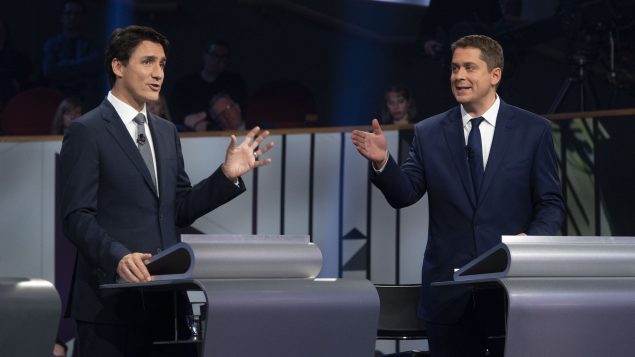
Liberal leader Justin Trudeau and Conservative leader Andrew Scheer take part in the the Federal leaders French language debate in Gatineau, Que. on Thursday, Oct. 10, 2019. (Adrian Wyld/THE CANADIAN PRESS)
Trudeau kicked off his pitch to Quebec voters by arguing that voting for the Bloc to represent Quebecers in Ottawa would relegate them to opposition benches instead of an opportunity to shape national policies at the cabinet level by electing enough Liberal members of parliament to give them another majority.
Trudeau urged Canadians to vote for a national party that can stand up to Conservative premiers in Alberta and Ontario who he said are determined to ignore the fight against climate change.
“We need to stand up to Conservatives like [Alberta Premier] Jason Kenney and [Ontario Premier] Doug Ford and the oil barons who are supporting them to continue the fight against climate change and build a better world,” Trudeau said.
Bernier, whose party denies the link between carbon emissions and climate change, said the Liberals will not be able to reach their Paris Accord goals because they would have to impose a carbon tax of up to $300 per tonne as opposed to the current plan to gradually raise the price of carbon to $50 per tonne.
The federal government should instead focus on concrete steps to prevent pollution in Canada and protect the environment, Bernier said.
Singh said the NDP will end subsidies to the oilpatch and will reinvest that money in renewable energy and public transit.
Scheer said as a father of five children he wants to make sure that the next generation will have a cleaner environment. However, Scheer has promised to abolish the Liberal carbon tax and instead offer economic incentives for companies that adopt environmentally friendly practices.
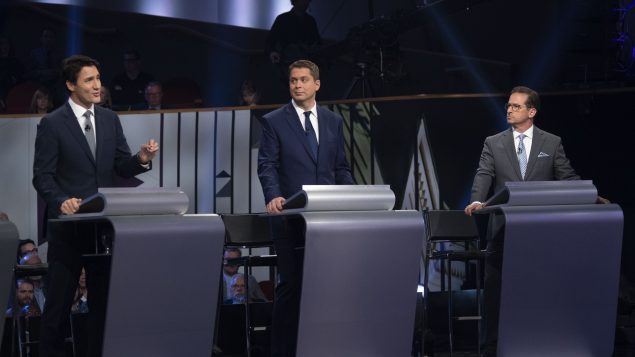
Federal party leaders, left to right, Liberal leader Justin Trudeau, Conservative leader Andrew Scheer, and Bloc Quebecois leader Yves-Francois Blanchet take part in the Federal leaders French language debate in Gatineau, Que. on Thursday, Oct. 10, 2019. (Adrian Wyld/THE CANADIAN PRESS)
Blanchet agreed with Singh that the federal government should stop subsidizing the oil and gas industry.
“We are too close to a point of no return,” May said, adding that her Green Party is the only federal party whose plan is in line with the UN’s Intergovernmental Panel on Climate Change (IPCC).
May said it was essential to create a “war cabinet” like the one Canada had during the Second World War to fight climate change.
In a three-way debate between May, Blanchet and Trudeau, the Green Party leader criticized the Liberals for not doing enough to reach the Paris goals.
As the debate opened up to Scheer, Bernie and Singh, the issue of building a pipeline through Quebec was addressed.
Scheer and Bernier, who are competing for the right-of-centre voters, exchanged words on whether or not as prime minister they would force a pipeline through Quebec.
Scheer tried to address the opposition to a pipeline through Quebec by referencing his energy corridor plan that would see Quebec’s hydroelectrical energy travel west as oil from Alberta and Saskatchewan travelled east to benefit the whole country.
Singh said he would not force a pipeline through Quebec under any circumstances.
Economy and finances
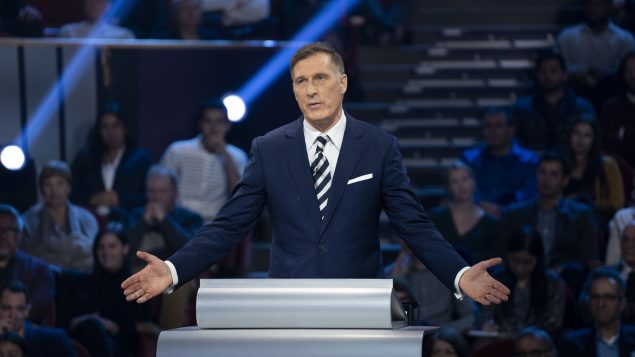
People’s Party of Canada leader Maxime Bernier speaks during the Federal leaders French language debate in Gatineau, Que. on Thursday, Oct. 10, 2019. (Chris Wattie/THE CANADIAN PRESS)
In the second segment of the evening on economy and finances, the leaders were asked what they would do to make life more affordable for seniors struggling to make ends meet.
All leaders except for Bernier promised a range of measures to improve the living standards of the seniors: from raising pensions and survivor benefits to offering free pharmacare and dental care.
Bernier said he would look into raising pensions only after balancing the country’s books, arguing that Canada’s credit card was full and there was no room to spend more.
“I won’t make promises that I can’t keep,” Bernier said.
The segment then turned into a three-way discussion between Singh, Blanchet and May who debated their parties’ tax proposals.
All three party leaders agreed on the need for higher taxes on wealthier Canadians. Singh vowed to impose higher taxes on the “ultrawealthy” Canadians, those with more than $20 million net worth, to pay for his party’s social programs.
Both Blanchet and May say they want to tax the web giants and use that money to support Canadian artists and media companies.
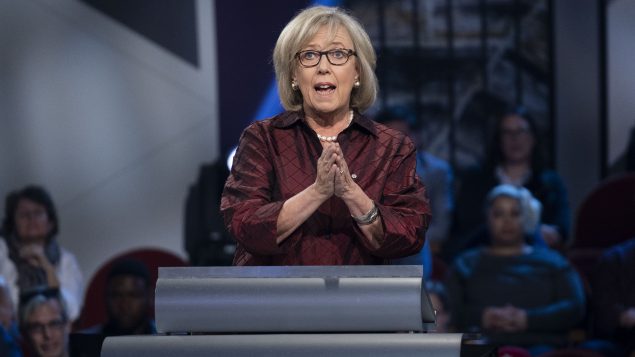
Green Party leader Elizabeth May speaks during the Federal leaders French language debate in Gatineau, Que. on Thursday, Oct. 10, 2019. (Chris Wattie/THE CANADIAN PRESS)
May argued that her party is the only one whose economic platform has been costed by independent reviewers and she vowed to balance Canada’s books in five years, unless a major global recession thwarts her plans.
The second trio to discuss taxes and deficits was Trudeau, Scheer and Bernier.
With Bernier to his right and Scheer to his left, Trudeau found himself under attack for his deficit spending. Trudeau said there was no point in saving a big pile of money when there are investments to be made today, to ensure the economy continues to grow.
Bernier attacked both Trudeau and Scheer saying he is the only one who promises to cut the deficit and that Liberal spending means that Canada has no wiggle room left if a major global recession were to hit soon.
Trudeau said, despite the multibillion deficits, Canada’s finances were in fine shape and that Canada and Germany were the only G7 countries with AAA credit rating.
Services to Canadians
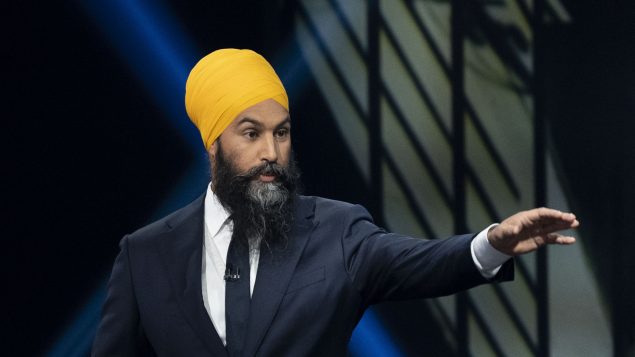
NDP leader Jagmeet Singh takes part in the the Federal leaders French language debate in Gatineau, Que. on Thursday, Oct. 10, 2019. (Chris Wattie/THE CANADIAN PRESS)
Services to French speaking Canadians was the next issue discussed at the debate with all six party leaders agreeing that more needed to be done to ensure that French Canadians outside of Quebec had access to services in their native tongue.
Then the leaders were asked what they were planning to do to tangibly improve the lives of Indigenous Canadians.
Singh said that Trudeau talks a good game publicly, but his actions in private were the problem. Singh said he would respect Indigenous communities as a starting point and that good policy would flow from that.
Scheer said he would appoint a minister whose job it would be to ensure that Canada was fulfilling its treaty rights to Indigenous Canadians and that his government would ensure it met its commitments.
Trudeau touted the investments his government has made across Canada since coming to power and promised to make sure funding was in place for residents of remote communities to deal with the problems they face.
May was the only one of the leaders who made a point of acknowledging that the debate was being held on the unceded territory of the Algonquin Nation.
Bernier said he would scrap the colonial era Indian Act, which sets the foundation of Ottawa’s relationship with Canada’s Indigenous Peoples.
Foreign policy and immigration
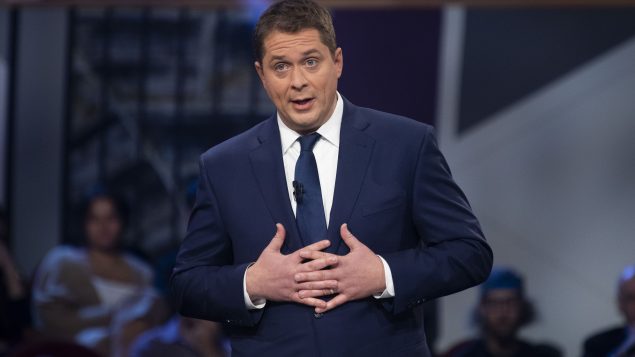
Conservative leader Andrew Scheer takes part in the the Federal leaders French language debate in Gatineau, Que. on Thursday, October 10, 2019. (Adrian Wyld/THE CANADIAN PRESS)
Canada’s bruising diplomatic showdown with China was the starting point of the debate on foreign policy and immigration with party leaders being asked whether they were willing to stop trade with China if the situation does not improve.
Trudeau said Canada’s priority was to secure the release of two Canadians who were arrested by Chinese authorities last December days after Canada arrested Huawei’s chief financial officer Meng Wanzhou on a U.S. arrest warrant.
Trudeau said his government has rallied Canada’s allies to put international pressure on China to release the two detained Canadians.
“We will continue to seek a solution to this issue while recognizing that China is a growing economy that is creating economic opportunities for our producers and for our workers but we always need to be there to defend our values and principles,” Trudeau said.
Scheer said it’s not a great surprise that China has lost respect for the Liberal leader “after Trudeau’s disastrous trip to India.”
“Mr Trudeau did absolutely nothing to protect Canadians over nine months,” Scheer said. “As prime minister, I will remove Canadian money from the Asian Infrastructure Bank. That is a bank that is controlled by the Chinese government, there is no good reason for taxpayer’s money to be sent to build bridges and roads in other countries and support China’s foreign policy.”
Blanchet countered that Canada can’t pick fights with such giants as China and urged Ottawa to focus instead on its relationship with Saudi Arabia and stop Canadian arms sales to the kingdom over its repressive policies at home and the war in Yemen.
Identity, ethics and governance
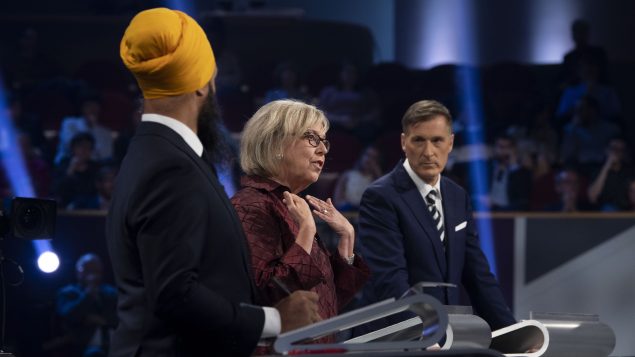
NDP leader Jagmeet Singh, left to right, Green Party leader Elizabeth May, and People’s Party of Canada leader Maxime Bernier take part in the the Federal leaders French language debate in Gatineau, Que. on Thursday, Oct. 10, 2019. (Adrian Wyld/THE CANADIAN PRESS)
All six leaders were asked by a woman who suffers from muscular dystrophy whether they were willing to relax the federal medically assisted suicide law, which is seen as too restrictive by some advocates.
All six said, yes they were willing to work to expand Canada’s right-to-die legislation to allow access to medically assisted suicide to more categories of citizens.
Secularism and Bill 21
All six leaders were asked by the debate moderator Radio-Canada anchor Patrice Roy to clarify their position on Quebec legislation that prohibits certain public service employees such as police officers, judges and school teachers from wearing visible religious signs.
Bill 21, as the legislation is known in Quebec, is being challenged in the courts.
All leaders except Trudeau said they would not intervene in the case because it relates to a matter which is squarely in the realm of provincial jurisdiction. Trudeau did not rule out that the federal government might have to intervene at a certain point because it has an obligation to protect basic freedoms guaranteed by the Canadian constitution.
SNC-Lavalin
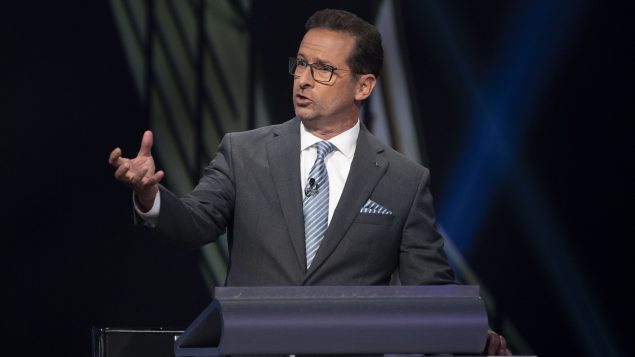
Bloc Quebecois leader Yves-Francois Blanchet takes part in the the Federal leaders French language debate in Gatineau, Que. on Thursday, Oct. 10, 2019. (Adrian Wyld/THE CANADIAN PRESS)
All leaders were asked by the moderator if they were in favour of giving SNC-Lavalin, which is facing corruption charges over its dealings in Libya, a deferred prosecution agreement.
Bernier said no corporation is above the law and no exception should be made for the Canadian engineering giant, otherwise Canadians might lose trust in the justice system.
Singh said that it was very difficult to agree with Bernier, but that he had to take his side accusing Trudeau of trying to help out his “cronies” at SNC-Lavalin.
Trudeau said that almost all of Canada’s allies have a remediation agreement regime to protect workers from bad decisions made by corrupt managers. But the decision belongs to the attorney general and the justice minister and he would respect that decision once it’s made.
Trudeau’s previous attorney general and justice minister resigned from cabinet following media reports that she was demoted to a less prestigious portfolio after refusing to intervene in the case.
Blanchet said that Trudeau was right, that the 3,400 SNC-Lavalin employees in Quebec need to be protected and that if federal parties ignored how the decision would impact workers and the Quebec economy, which would lose one of its crown jewels.
Scheer countered that Canada’s jewel is the independence of its judiciary and that Trudeau intervened because the only job he wanted to save was his own.
With files from CBC News







For reasons beyond our control, and for an undetermined period of time, our comment section is now closed. However, our social networks remain open to your contributions.